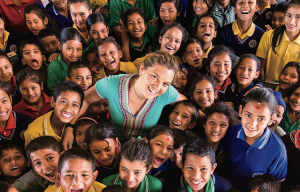 Like many teenagers who’ve just completed high school, Maggie Doyne set off to travel the world during her gap year before starting college. However, for Doyne, this would be a life-changing journey.
Like many teenagers who’ve just completed high school, Maggie Doyne set off to travel the world during her gap year before starting college. However, for Doyne, this would be a life-changing journey.
The New Jersey resident set off for Fiji where she put up residence in a Buddhist monastery while helping to rebuild a sea wall. She then set off for India where she worked with Nepalese refugees. Here she met a teenager named Sunita, who wanted to know if her home in Nepal was still standing. As their friendship evolved, Doyne offered to go to Nepal with her, where she met a little 6-year-old girl, named Hima, who was breaking rocks and selling them to earn money for her family.
The turning point
Doyne walked into what was a country recovering from a decade long civil war. “What I saw and experienced changed me,” says Doyne, 28. “Women and children were struggling to survive. Children were working to break and sell stones from the riverbed just to survive. I wanted to do something.”
Doyne decided to do what she could to help Hima. She paid for her tuition, books and uniform and saw her life begin to transform. Then Doyne started helping a few more children. However, there were always more children to help. Soon, the money she had just wasn’t enough. It was time to do something more.
Doyne had saved up $5,000 from babysitting. Without a second thought, she called her parents and asked them to wire the money to her. She used the money to purchase a piece of land in Surkhet, West Nepal in 2006. Through the assistance of the local community and the BlinkNow foundation she had co-founded with Top Bahadur Malla, Doyne oversaw the construction of Kopila Valley Children’s Home.
Today, more than 50 children call Kopila (which means ‘Flower Bud’ in Nepali) home. The home is run by a dedicated team of caregivers known to the children as ‘uncles’ and ‘aunties’. The children chip in to keep the home clean.
A growing dream
Through the BlinkNow Foundation, Doyne established Kopila Valley School, which opened its doors in 2010. The school educates over 350 children from Surkht and the surrounding communities. The faculty at the school is all Nepali. Students of the school are provided with health care and one nutritious meal a day in the school’s lunch program.
The foundation has established a counseling center, a small clinic and is now growing food for the lunch school program to ensure that it is sustainable. The foundation has purchased a new piece of property where they will establish an off-grid green campus. They’ve also opened a Women’s Center which is now a large part of the community.
“It’s become about much more than a teenager with her backpack and a big dream,” says Doyne. “It’s about the community. I want to teach people by example what the world could look like.”
